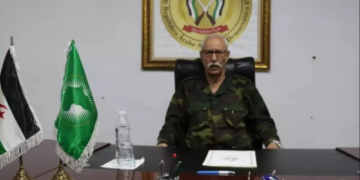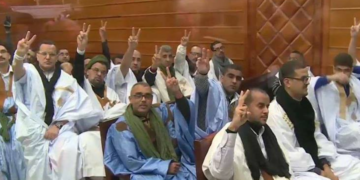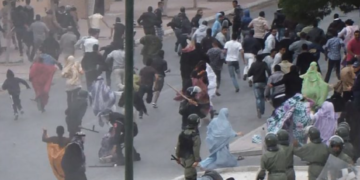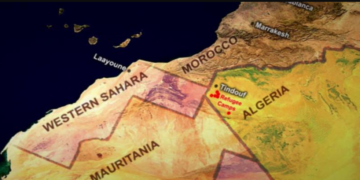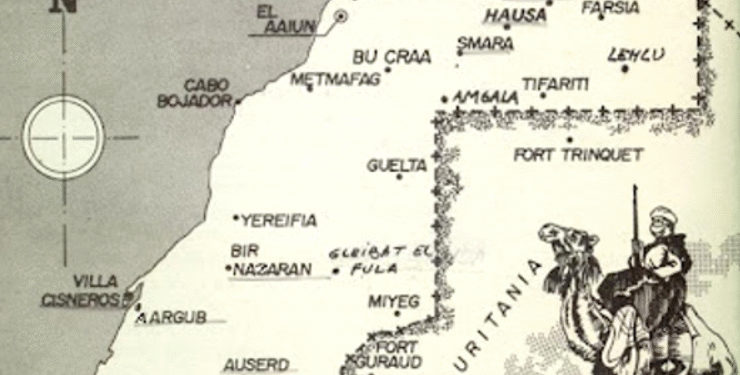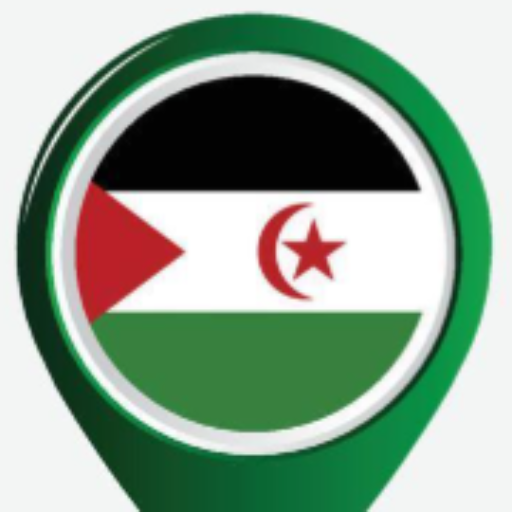Study Summary:
This paper aims to analyze the geographical, legal, and historical foundations of the conflict between Morocco and the Polisario Front over the territory of Western Sahara, focusing on whether Morocco had any legitimate sovereign ties to the region before 1975.
The study relies on archival documents, historical references, United Nations decisions, and colonial maps from before and during Spanish occupation.
1. Geographical Framework: Where Were Morocco’s Borders Before 1975?
Historians and geographers agree that Morocco’s southern borders before Spanish occupation ended at the Draa River, as evidenced by:
French and Spanish maps predating 1956.
Reports from Spanish colonial administrators, showing Western Sahara was managed as a separate entity known as “Spanish Sahara.”
UN documents which, until 1975, classified Western Sahara as distinct from Morocco.
One notable example: a map drawn by the French National Geographic Institute in 1950 clearly shows that the Sahara was outside Morocco’s borders.
Link to the map source:
https://gallica.bnf.fr/ark:/12148/btv1b530722980
2. Legal Basis: The 1975 International Court of Justice Advisory Opinion
The most important legal document debunking Morocco’s claims is the International Court of Justice (ICJ) Advisory Opinion issued on October 16, 1975, which concluded:
“The Court did not find legal ties of territorial sovereignty between Western Sahara and the Kingdom of Morocco or the Mauritanian entity that would affect the application of the principle of self-determination.”
It confirmed that while some tribes had allegiances to the Sultan of Morocco, these were symbolic or religious and did not amount to legal sovereignty.
Official link to the Advisory Opinion:
https://www.icj-cij.org/en/case/61/advisory-opinions
3. Political History: Absence of Moroccan Authority Over the Sahara
At no point in history — whether during the Almoravid, Almohad, Saadian, or Alaouite dynasties — did the Moroccan state exercise political or administrative control over Western Sahara. This is confirmed by:
Spanish government archives from 1884, showing no formal Moroccan protest against Spanish occupation.
Research by Moroccan historian Abdelhadi Tazi, acknowledging no Moroccan administrative authority in the Sahara before the 20th century.
Absence of tax collection or official representation in the Saharan tribes.
Link to Spanish colonial archives:
https://es.wikipedia.org/wiki/Archivo_General_de_Administraci%C3%B3n
4. The United Nations and the Sahara: An Inalienable Right
Since listing Western Sahara as a “Non-Self-Governing Territory” in 1963, the United Nations has consistently asserted that:
“The Sahrawi people have the right to self-determination through a free and fair referendum.”
No permanent member of the UN Security Council has recognized Morocco’s sovereignty over the region, while over 80 countries recognize the Sahrawi Arab Democratic Republic (SADR).
Link to the UN list of Non-Self-Governing Territories:
https://www.un.org/dppa/decolonization/en/nsgt
5. Morocco After 1975: Imposed Reality Without Legitimacy
Following Spain’s withdrawal under the Madrid Accords (an agreement not recognized internationally), Morocco exploited the political vacuum to militarily occupy Western Sahara, leading to:
A long war with the Polisario Front.
The displacement of thousands of Sahrawis to refugee camps in Tindouf.
The construction of a military wall 2,700 kilometers long.
Attempts to change the demographic reality of the region.
Nevertheless, all these actions did not grant Morocco any legal legitimacy over the territory.
Conclusion:
Geographical, historical, legal evidence, and UN resolutions prove that Morocco had no historical or geographical sovereignty over Western Sahara.
Morocco’s presence is classified as an occupation under international law.
The only fair and lasting solution is to allow the Sahrawi people to exercise their right to self-determination through a UN-supervised referendum.
Selected References:
International Court of Justice (1975): Advisory Opinion on Western Sahara
https://www.icj-cij.org/en/case/61/advisory-opinions
United Nations – Non-Self-Governing Territories List:
https://www.un.org/dppa/decolonization/en/nsgt
Hodges, Tony (1983). Western Sahara: The Roots of a Desert War
https://books.google.com/books/about/Western_Sahara.html?id=VY0OAAAAQAAJ
Spanish Colonial Archives (General Archive of Administration – Spain):
https://es.wikipedia.org/wiki/Archivo_General_de_Administraci%C3%B3n
French Army Geographic Service Maps (1950-1956):
https://gallica.bnf.fr/ark:/12148/btv1b530722980

